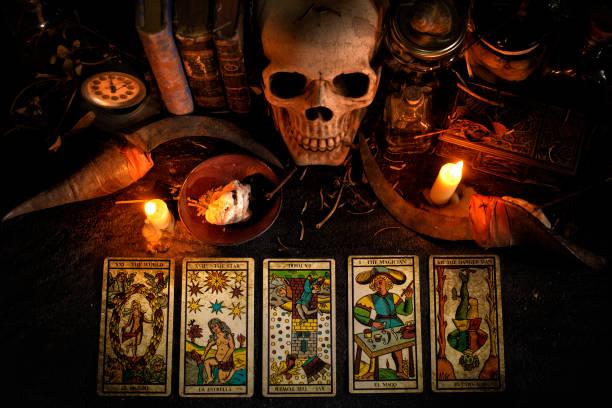Magic has always held a special allure for people. Whether in ancient rituals or modern fantasy literature, the fascination with casting spells remains strong. From voodoo love spells to complex rituals like "Ring of Spell Storing" in Dungeons & Dragons 5th Edition (5e), the concept of controlling fate or manipulating outcomes through magic continues to captivate.
In this article, we'll dive into various kinds of spells, their significance in different contexts, and explore the myths, legends, and modern interpretations surrounding them. We'll touch on love spells, lottery spells, money spells, curses, and even delve into spellcasting in popular games like Dungeons & Dragons.
1. Voodoo Love Spells
Voodoo, a spiritual and magical practice rooted in West African traditions, Haitian culture, and Southern U.S. regions, often incorporates various kinds of spells, including love spells. Voodoo love spells are believed to influence the emotions and desires of individuals, enhancing attraction and affection. These spells typically involve intricate rituals that use personal items such as hair, photographs, or clothing.
The ethical dilemma surrounding love spells is significant. Some practitioners argue that using magic to influence someone’s will goes against free will, while others suggest it’s a form of empowerment. In voodoo, love spells are often cast with the intention of bringing balance, peace, and harmony in relationships, yet they must be conducted with care and responsibility.
2. Dungeons & Dragons (5e) Magic Items and Spell Casting
In Dungeons & Dragons 5e, magic spells and items add an exciting layer to gameplay. Among these, the Ring of Spell Storing stands out as a prized item. This ring can store up to five levels worth of spells, which can be cast later, even by someone who isn't a spellcaster.
For example, a player could store lower-level spells like Cure Wounds or Magic Missile, or even higher-level spells if they can fit within the five-level limit. A dungeon master can use the Ring of Spell Storing creatively to empower non-magic characters or add an element of surprise in battle.
Another popular spell in D&D 5e is the Remove Curse spell. It allows a character to lift curses from objects, places, or people. Removing a curse in the game might lift negative effects that impair abilities or trap characters within certain states.
This kind of magical engagement provides a unique, strategic layer for players and can dramatically influence the course of a campaign.
3. Pax Dei Magic Spells
Pax Dei, a term meaning "Peace of God" in Latin, doesn’t traditionally involve spell casting in the magical sense but refers more to religious decrees aimed at ensuring peace during times of war, especially in medieval times. However, in the realm of mysticism and occultism, practitioners may use this term to refer to spells or rituals intended to bring about peace, protection, and harmony.
These spells may invoke divine energies or celestial powers to safeguard an individual or a community. Modern interpretations often link them to protection spells, invoking spiritual peace and tranquility, particularly in difficult times.
4. Lottery Spells
Spells to win the lottery have long been a subject of fascination for those seeking wealth and fortune. Many spellcasters claim that they can influence the outcome of lottery draws by using various rituals and chants. A lottery spell might involve writing the numbers on a specific type of parchment, using special oils or herbs, and invoking the aid of a deity or a spiritual guide known for luck.
Despite the allure of such spells, the ethics and effectiveness are debatable. Most practitioners advise treating money spells like lottery spells with care, noting that they should be cast with pure intentions and without greed. The law of threefold return, which states that what you put out into the universe returns threefold, is often cited as a reason for using caution when casting such spells.
5. Money Spells
Money spells, much like lottery spells, aim to increase wealth and prosperity. These spells are usually less specific than lottery spells and focus more on creating abundance in the caster’s life. Ingredients like green candles (symbolizing wealth), coins, and herbs like basil are frequently used in money rituals. The goal may not always be to receive a sudden windfall but to attract steady and sustainable financial growth.
Many believe that the energy put into a money spell can create opportunities, inspire creativity, or lead to unexpected financial gains. Again, like other spells, the intention behind the spell plays a vital role. Those who cast with selfish or dishonest motives might find the spell backfiring or yielding unsatisfactory results.
6. Marriage Spells
Marriage spells are designed to strengthen relationships and lead to long-lasting partnerships. Some use these spells to encourage commitment, while others hope to find a soulmate or life partner. Similar to love spells, marriage spells often require personal items from both parties involved.
Common components for marriage spells include rose petals, honey (to "sweeten" the relationship), and ribbons to represent the union. Spellcasters are often careful to emphasize that marriage spells should be cast only with the intention of enhancing an existing bond or deepening love rather than forcing a relationship to happen.
7. Revenge Spells
Revenge spells fall into the category of black magic, and they are intended to harm or punish someone who has wronged the caster. These spells often involve dark and ominous ingredients, such as candles, animal bones, or effigies. Revenge spells carry a significant ethical burden, as they interfere with the natural balance of justice and can lead to unintended consequences.
Many spiritual leaders caution against using revenge spells, as the energies involved are often volatile and can backfire. The karmic repercussions can be severe, as casting a revenge spell typically invites negative energy into the caster's life. Instead, many recommend seeking peace or resolution through forgiveness rather than revenge.
8. Binding Spells
Binding spells are intended to stop someone from causing harm, either to the caster or others. These spells can be a form of protection, often involving knotting cords, sealing something in a jar, or writing the name of the person to be bound on a piece of paper that is then locked away.
Unlike revenge spells, binding spells aren’t necessarily cast out of malice. They’re often considered defensive spells that prevent an individual from spreading negativity or hurt. These spells can be effective tools for stopping harmful behaviors or preventing toxic individuals from influencing a situation.
9. BG3 Remove Curse Spell
In the game Baldur’s Gate 3 (BG3), the Remove Curse spell works similarly to Dungeons & Dragons 5e. It allows a character to remove curses from themselves or others, providing an essential service in a world filled with dangerous magical artifacts and effects. As curses can cause lasting harm, possessing the ability to lift them gives players a strategic advantage in the game.
BG3 immerses players in a world where magic can alter the course of events, and removing a curse might mean the difference between life and death for their character. The spell’s importance lies in its utility and the strategic options it offers players as they navigate the game's challenges.
Conclusion
Spells, whether in voodoo traditions, role-playing games, or modern occult practices, reflect a deep-rooted human desire for control over life’s uncertainties. From love and wealth to protection and revenge, magic offers a way to channel intent and energy into shaping one's reality. However, with great power comes great responsibility. Whether you're casting a spell in real life or playing in a fantasy setting like Dungeons & Dragons or Baldur’s Gate 3, understanding the ethical implications and potential consequences of spellcasting is vital.
Magic can be a fascinating tool for those who wield it with knowledge, respect, and care, reminding us that while we may not be able to control everything in life, we can influence the energies around us to some degree.



